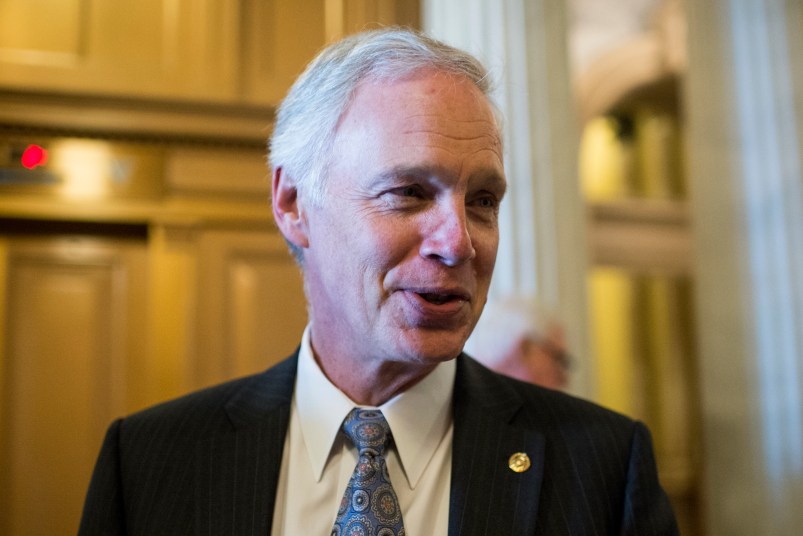WASHINGTON (AP) — Republican leaders gained support from one more senator for the GOP tax bill on Friday, giving needed momentum to the effort and boosting leaders’ hopes that they can push the $1.4 trillion legislation through the Senate later in the day.
Sen. Ron Johnson, R-Wis., will now vote for the measure, according to an aide. In an interview with Wisconsin radio station WISN, Johnson said leaders had agreed to make tax breaks more generous for millions of businesses, which he’s been demanding for weeks.
“I sought assurance and I was given assurance that I will be at the table” when Senate-House bargainers write a compromise version of the bill, Johnson said of talks he had with GOP leaders Thursday night.
Johnson’s vote is crucial as top Republicans seek to nail down backing from at least 50 GOP senators. With the party controlling the Senate 52-48 and Democrats uniformly opposed, they need 50 votes to win approval for the bill; Vice President Mike Pence would break a tie.
The bill seemed to be sailing toward passage Thursday, until a report was released by Congress’ nonpartisan Joint Committee on Taxation estimating the package would produce budget deficits totaling $1 trillion over the coming decade.
Trump administration officials and leading congressional Republicans have said the measure’s tax cuts would spark enough economic growth to pay for the lowered levies. The projection left the votes of several GOP lawmakers in doubt, including Sens. Bob Corker of Tennessee and Arizona’s Jeff Flake.
Sen. Susan Collins, R-Maine, proposed an amendment to let homeowners deduct up to $10,000 in local property taxes on their federal returns. It’s similar to a provision in the House-passed bill. Without the deduction, Collins said, it would be “very problematic for me” to vote for the bill.
Amid a whirl of meetings and dramatic votes Thursday evening, the Senate GOP leaders were rewriting the bill behind closed doors. Changes being discussed included rolling back some of the tax cuts after six years to appease deficit hawks — notably Corker and Flake. If leaders could win over Collins and there were no other defectors, Corker and Flake could oppose the measure, and it would still be approved.
At stake is a top priority for President Donald Trump and a Republican Party that considers passage of the measure the best way to preserve the GOP’s congressional majorities in next year’s midterm elections.
Another faction to be reckoned with: senators supporting millions of businesses whose owners report the firm’s profits on their individual tax returns. The vast majority of U.S. businesses, big and small, are taxed this way. Sen. Steve Daines, R-Mont., backed the tax legislation Wednesday after securing an increase in the deduction for business income from 17.4 percent to 20 percent.
Johnson said Friday that he was won over after GOP leaders offered to boost that deduction to 23 percent.
The scramble to alter the bill came after the Senate’s parliamentarian ruled that automatic “triggers” designed to guard against big deficits would violate Senate rules. GOP leaders’ main concern was winning over the hawks worried about adding more red ink to the mounting $20 trillion deficit.
Senate Majority Leader Mitch McConnell, R-Ky., had expressed confidence early in the day, but he has little margin for error with a 52-48 Republican majority. He can afford to lose only two votes while counting on Vice President Mike Pence to break the tie.
Sen. John Cornyn of Texas, the No. 2 Republican in the Senate, said the bill will have “alternative, frankly, tax increases we don’t want to do” to address deficit concerns.
Flake said the “trigger” tax increases would raise about $350 billion over 10 years, though he didn’t specify which taxes would go up.
In a dramatic turn, Democrats forced a vote on whether to return the measure to the Senate Finance Committee so it could be rewritten to ensure smaller deficits. After holding out for nearly an hour during the vote, Corker, Flake and Johnson eventually joined fellow Republicans to scuttle the Democratic proposal.
Corker has pushed to add automatic tax increases in future years if the package doesn’t raise as much revenue as projected.
The overall legislation would bring the first overhaul of the U.S. tax code in 31 years. It would slash the corporate tax rate, offer more modest cuts for families and individuals and eliminate several popular deductions.
Unlike the tax bill passed by the House two weeks ago, the Senate measure would end the requirement in President Barack Obama’s health care law that people pay a tax penalty if they don’t buy health insurance.
The tax cuts for individuals in the Senate plan would expire in 2026 while the corporate tax cuts would be permanent.
Both the House and Senate bills would nearly double the standard deduction to around $12,000 for individuals and about $24,000 for married couples.
After Senate passage, lawmakers will try to reconcile the Senate bill with the House version in hopes of delivering a first major legislative accomplishment to Trump by Christmas.







Oh wow! I had such high hopes that Mr. IQ (RoJo) would hold out because he saw the bill as unjust. My heart is broken.
Oh yeah, he and his family business will be at the table! No diving under the table for scraps, he’s going to get his slice of the pie direct from the source. Wisconsin voters must be thrilled with their handiwork.
Ron Johnson is proof positive that stupid goofballs can achieve some measure of wealth. The notion that people of wealth naturally have some measure of smarts and wisdom remains false.
He always makes noise and then folds. The guy is a phony.
table is the wrong word “trough” is what I think you meant